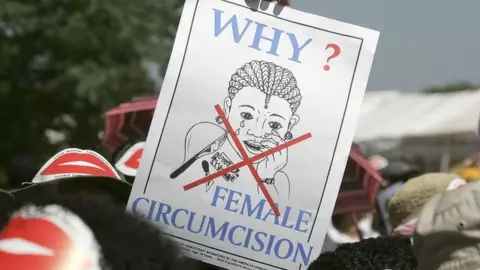Burkina Faso botched FGM leaves 50 girls in hospital
 AFP
AFPAround 50 girls are being treated in hospital in Burkina Faso after botched circumcisions, or female genital mutilation (FGM), a minister says.
Not all girls who underwent the circumcision have been traced, Minister of Women's Affairs, Laurence Marshall Ilboudo, said.
Two 60-year-old women, along with the parents of some of the girls, have been arrested.
FGM has been illegal in Burkina Faso since 1996.
Offenders face up to three years in prison.
About three-quarters of women and girls in Burkina Faso have undergone circumcision, but only 9% favour the practice, according to UN children agency Unicef.
The circumcisions took place in the Kaya area, about 100km (60 miles) north of the capital, Ouagadougou, between 4 and 6 September.
Some of the victims are as young as four years, authorities say.
A dozen girls have been admitted to the Kaya Regional Hospital and 38 to the Chiphra Protestant Hospital in the capital.
Some of the girls had suffered serious complications, Dr Dieudonne Ouedraogo told the BBC.

Female genital mutilation
- Includes "the partial or total removal of the female external genitalia or other injury to the female genital organs for non-medical reasons"
- Practised in 30 countries in Africa and some countries in Asia and the Middle East
- An estimated three million girls and women worldwide are at risk each year
- About 125 million victims estimated to be living with the consequences
- It is commonly carried out on young girls, often between infancy and the age of 15
- Often motivated by beliefs about what is considered proper sexual behaviour, to prepare a girl or woman for adulthood and marriage and to ensure "pure femininity"
- Dangers include severe bleeding, problems urinating, infections, infertility and increased risk of childbirth complications and newborn deaths
Source: World Health Organization

